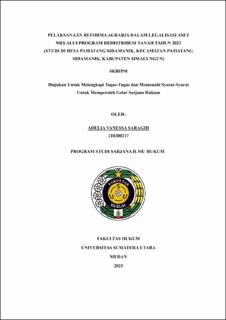| dc.contributor.advisor | Yamin, Muhammad | |
| dc.contributor.advisor | Zaidar | |
| dc.contributor.author | Saragih, Adelia Vanessa | |
| dc.date.accessioned | 2025-07-30T08:37:04Z | |
| dc.date.available | 2025-07-30T08:37:04Z | |
| dc.date.issued | 2025 | |
| dc.identifier.uri | https://repositori.usu.ac.id/handle/123456789/107901 | |
| dc.description.abstract | The implementation of agrarian reform in asset legalization through the land redistribution program is an effort to achieve equitable distribution of land tenure and improve community welfare. This research discusses the implementation of land redistribution in fiscal year 2023 in Pamatang Sidamanik Village, Pamatang Sidamanik District, Simalungun Regency. The focus of the study includes the process of asset legalization through land redistribution, its impact on the socio-economic conditions of the community, and the obstacles that arise during implementation. This research also analyzes the role of the government in ensuring legal certainty over land and supporting the success of agrarian reform at the local level.
This research uses empirical juridical research method with qualitative approach. Data were obtained through literature study and field study in the form of structured interviews with the Simalungun Regency BPN, Pamatang Sidamanik Village Head, and land redistribution recipients. Data sources consist of primary and secondary data, including primary, secondary, and tertiary legal materials. Data analysis is conducted qualitatively to obtain a factual picture of the implementation of land redistribution as part of agrarian reform in Pamatang Sidamanik Village.
The results showed that the implementation of agrarian reform in asset legalization through the 2023 land redistribution program in Pamatang Sidamanik Village has been structured and in accordance with the provisions of Presidential Regulation No. 86/2018 on Agrarian Reform. A total of 63 parcels of land covering an area of ±7.082 Ha have been distributed to 54 heads of families in the form of property rights certificates. This legalization has a positive impact in the form of legal certainty, security, and strengthening the social position of the community. Although there has not been a significant economic improvement due to traditional land management patterns, land certification has reduced the potential for agrarian conflict and strengthened inheritance rights. The main obstacle faced is the lack of public understanding of the prohibition on transferring rights for 10 years. Overall, the legalization of land redistribution contributes to the creation of more equitable social welfare. | en_US |
| dc.language.iso | id | en_US |
| dc.publisher | Universitas Sumatera Utara | en_US |
| dc.subject | Agrarian Reform | en_US |
| dc.subject | Land Redistribution | en_US |
| dc.subject | Legal Certainty | en_US |
| dc.title | Pelaksanaan Reforma Agraria Dalam Legalisasi Aset Melalui Program Redistribusi Tanah Tahun 2023 (Studi Di Desa Pamatang Sidamanik, Kecamatan Pamatang Sidamanik, Kabupaten Simalungun) | en_US |
| dc.title.alternative | Implementation of Agrarian Reform in Asset Legalization Through The Land Redistribution Program in 2023 (Study in Pamatang Sidamanik Village, Pamatang Sidamanik Sub-District, Simalungun District) | en_US |
| dc.type | Thesis | en_US |
| dc.identifier.nim | NIM210200217 | |
| dc.identifier.nidn | NIDN0031126168 | |
| dc.identifier.nidn | NIDN0012095808 | |
| dc.identifier.kodeprodi | KODEPRODI74201#Ilmu Hukum | |
| dc.description.pages | 149 Pages | en_US |
| dc.description.type | Skripsi Sarjana | en_US |
| dc.subject.sdgs | SDGs 16. Peace, Justice And Strong Institutions | en_US |


